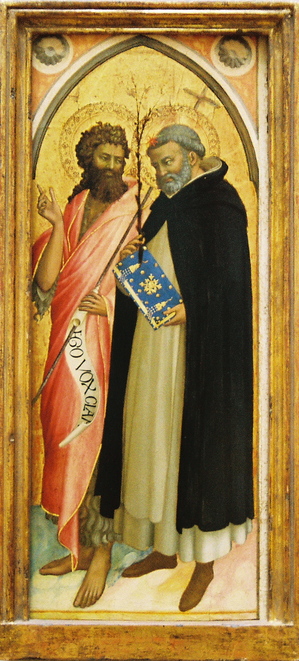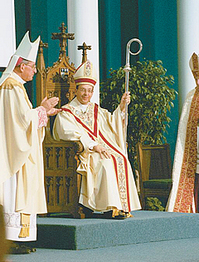Past days in the monastery
Life in a monastery is never boring. Living our lives seriously hardly leaves room for idleness. The abbey welcomes Christ in the visitors, including vocation guests, we receive. The presence of guests reminds us that we Christ is among us. And I am of the opinion that a religious house should rarely be without guests. The round of prayer, work, reading, dining (feeding is crude, so we politely dine) and private time is a lot. At the moment, time for self is not as plentiful as I want or need especially since I have to prepare for teaching and I want to do some study.
 One of my least favorite domestic chores is painting. Actually, I hate painting (probably because my father never really liked it either) and I only initiate the task when it is needed, or asked. I’d rather pay professionals to do the job of preparing the walls, painting and cleaning up. Here at Mary, Help of Christians (Belmont) Abbey I’ve been asked along with two others to paint a few hallways and a room. The companions are fine to work with, though one drives the work, getting mucked up with paint isn’t my idea of fun. BUT the walls do look good and the abbot and other monks are pleased. Happy to oblige. I am just hoping that we don’t have to paint the very long outside porch. The passage from
One of my least favorite domestic chores is painting. Actually, I hate painting (probably because my father never really liked it either) and I only initiate the task when it is needed, or asked. I’d rather pay professionals to do the job of preparing the walls, painting and cleaning up. Here at Mary, Help of Christians (Belmont) Abbey I’ve been asked along with two others to paint a few hallways and a room. The companions are fine to work with, though one drives the work, getting mucked up with paint isn’t my idea of fun. BUT the walls do look good and the abbot and other monks are pleased. Happy to oblige. I am just hoping that we don’t have to paint the very long outside porch. The passage from
St Paul has a daily impact on us today, Greek Orthodox, Archbishop Demetrios said
Catholics and Orthodox Christians are celebrating a Pauline year from
 A prime characteristic of
A prime characteristic of
Christ crucified represents “the medicine of first resort for every spiritual weakness” and thus there can be “no possibility of compromise.” According to
“What is the church” but the body of Christ, allowing for no divisions.
“We encounter the word ‘brother’ 34 times” in
In addition,
While “self-styled apostles” took advantage of the people to whom they preached, “
(Archbishop Demetrios, Sixth Annual Cardinal Anthony Bevilacqua Lecture (Nov. 23), Immaculate Conception Seminary, Rockville Centre Diocese, Pete Sheehan for CNS, Dec. 2, 2008, adapted)
Blessed Fra Angelico
 Known in the Dominicans as Brother John from
Known in the Dominicans as Brother John from
In declaring Fra Angelico the Patron of Catholic Artists in 1982, Pope John Paul II said: “Angelico was reported to say “He who does Christ’s work must stay with Christ always”. This motto earned him the epithet “Blessed Angelico”, because of the perfect integrity of his life and the almost divine beauty of the images he painted, to a superlative extent those of the Blessed Virgin Mary.”
Fra Angelico’s grave stone in the Dominican Church of Santa Maria sopra Minerva (
When singing my praise, don’t liken my talents to those of Apelles. Say, rather, that, in the name of Christ, I gave all I had to the poor. The deeds that count on Earth are not the ones that count in Heaven. I, Giovanni, am the flower of
When in
Pope Benedict meets with Pope Pelosi
The Holy See’s Press Office released a statement this morning about the US Speaker of the House’s visit to the Holy See and to the Pope:
Following the General Audience the Holy Father briefly greeted Mrs. Nancy Pelosi, Speaker of the United States House of Representatives, together with her entourage.
His Holiness took the opportunity to speak of the requirements of the natural moral law and the Church’s consistent teaching on the dignity of human life from conception to natural death which enjoin all Catholics, and especially legislators, jurists and those responsible for the common good of society, to work in cooperation with all men and women of good will in creating a just system of laws capable of protecting human life at all stages of its development.
 Good for the Pope. I wish I could’ve been there watching the Speaker’s face while the Pope teaches her (and her entourage) the orthodox faith including the various constituent components of Catholic moral teaching. I’m sure she knew that the Pope would say something about her heterodoxy but I bet she didn’t expect such a direct address. Or, did she? You know, she’s not very clear on these things so every little bit helps. Perhaps now she’ll actually become a believing Catholic and not one that merely picks and chooses what to believe so as to keep an influential job.
Good for the Pope. I wish I could’ve been there watching the Speaker’s face while the Pope teaches her (and her entourage) the orthodox faith including the various constituent components of Catholic moral teaching. I’m sure she knew that the Pope would say something about her heterodoxy but I bet she didn’t expect such a direct address. Or, did she? You know, she’s not very clear on these things so every little bit helps. Perhaps now she’ll actually become a believing Catholic and not one that merely picks and chooses what to believe so as to keep an influential job.
Now, can we get Joe Biden and the other Catholics in Congress to meet Pope Benedict?
Ignace Joseph III enthroned as new Syrian Catholic Patriarch
The new Syrian Patriarch, Ignace Joseph III Younan, elected on January 22nd was enthroned on February 15th in Beirut. The story of the event is here and here. It is interesting to note the theological and liturgical differences between Western & Eastern Catholics. The Patriarch was enthroned, not installed. The proper term is enthroned; one installs computer software and a new dishwasher, not a bishop. To enthrone a bishop means that he is led to his chair and seated. Of course there’s more to the rite but that’s it essentially. Worldwide the Syrian Catholics number about 200, 000.
 The point of this note isn’t the size of a bishop’s chair as it was to draw attention to a new Eastern Catholic Patriarch. That said, for some, parsing the difference between enthronement vs. installation may be overly picky. The liturgical theology of the Church says that bishops sit on cathedras (substantial looking chairs), not thrones even if some look more like thrones than mere a big chair. That some bishops may look like plenipotentiaries, even act like them, they’re not. But to say that a bishop is led to a choir stall, like an abbot is upon his election, is not quiet correct either. How long has the word “installation” been used to denote the act of inaugurating a bishop’s ministry? I think some people who claim to be liturgists tend to force a new agenda on the Church using inaccurate jargon. But I defer to a great authority.
The point of this note isn’t the size of a bishop’s chair as it was to draw attention to a new Eastern Catholic Patriarch. That said, for some, parsing the difference between enthronement vs. installation may be overly picky. The liturgical theology of the Church says that bishops sit on cathedras (substantial looking chairs), not thrones even if some look more like thrones than mere a big chair. That some bishops may look like plenipotentiaries, even act like them, they’re not. But to say that a bishop is led to a choir stall, like an abbot is upon his election, is not quiet correct either. How long has the word “installation” been used to denote the act of inaugurating a bishop’s ministry? I think some people who claim to be liturgists tend to force a new agenda on the Church using inaccurate jargon. But I defer to a great authority.
Is he sorry?
 Tonight’s evening news had an update on the A-Rod drug scandal. What I find amazing is that a man would admit to taking steroids, citing pressure, to enhance his performance to play a high profile sport and get paid $275 million (by all accounts a record). A-Rod must think everybody is looking the other way and stupid. His defense was that as 25 year old he made some stupid decisions.
Tonight’s evening news had an update on the A-Rod drug scandal. What I find amazing is that a man would admit to taking steroids, citing pressure, to enhance his performance to play a high profile sport and get paid $275 million (by all accounts a record). A-Rod must think everybody is looking the other way and stupid. His defense was that as 25 year old he made some stupid decisions.
Fair enough, we all do things we regret. No one, except the Savior of mankind and the BVM can claim otherwise. Original Sin has deeply affected our lives. As a Catholic, I can testify to the beauty of the Catholic faith by the mercy experienced when you ask for the mercy of God (forgiveness!) through the sacrament of Confession, make amends with your brothers and sisters AND you change your life. I don’t know A-Rod’s faith life but something seems out of whack here in that he still has a job playing baseball and he’s still being looked upon as a hero. Not telling the truth is a serious offence. If the news caught A-Rod expressing his sorrow by saying “I am sorry” to the public, it wasn’t aired. I wonder if he said those 3 words. Personally, I think the Yankees should fire the man AND go to confession. But that’s me.
Moreover, a 9 year old child told a report that what A-Rod did “wasn’t wrong but he should not have used drugs.” Not wrong? WHAT???? I suppose the child’s moral formation is still in flux at the moment but this is crazy. I’d like to know what the parents teach this young man. What moral formation does this child get in school, in church, in the Boy Scouts?
Blackfriars Rep in the NYTimes
In the Saturday (February 13, 2009) issue of the NYTimes’ Connecticut section there’s an article on the excellent work of Blackfriars Repertory Theatre. Have a read…
The Pope’s brief thoughts on the sacred Liturgy, prayer and belief
Pope Benedict spoke of “teaching the art of prayer, encouraging participation in the liturgy and the Sacraments, wise and relevant preaching, catechetical instruction, and spiritual and moral guidance. From this foundation faith flourishes in Christian virtue, and gives rise to vibrant parishes and generous service to the wider community” to the Nigerian bishops making their ad limina.
Later the Pope said: “The celebration of the liturgy is a privileged source of renewal in Christian living” and “to maintain the proper balance between moments of contemplation and external gestures of participation and joy in the Lord”.
New Saints
During a public Ordinary Consistory in the Clementine Hall
Zygmunt Szczęsny Feliński, bishop, founder of the Congregation of Franciscan Sisters of the Family of Mary;
Arcangelo Tadini, priest, founder of the Congregation of Worker Sisters of the House of Nazareth;
Francis Coll y Guitart, priest of the Order of Friars Preachers (Dominicans), founder of the Congregation of Dominican Sisters of the Annunciation of the BVM;
Joseph Damian de Veuster, priest of the Congregation of the Sacred Hearts of Jesus and Mary of the Perpetual Adoration of the Most Blessed Sacrament of the Altar;
Bernard Tolomei, abbot, founder of the Congregation of Saint Mary of Monte Oliveto of the Order of Saint Benedict;
Rafael Arnáiz Barón, religious of the Order of Cistercians of the Strict Observance;
Nuno of Saint Mary Álvares Pereira, religious of the Order of Carmelites;
Gertrude (Catherine) Comensoli, virgin, founder of the
Marie of the Cross (Jeanne) Jugan, virgin, founder of the Congregation of the Little Sisters of the Poor;
Catherine Volpicelli, virgin, founder of the Congregation of the Handmaids of Sacred Heart.
The ceremony of Canonization of the Blesseds: Zygmunt Szczęsny Feliński; Francisco Coll y Guitart; Jozef Damian de Veuster; Rafael Arnáiz Barón e Marie de la Croix (Jeanne) Jugan will be Sunday, 11 October 2009.
